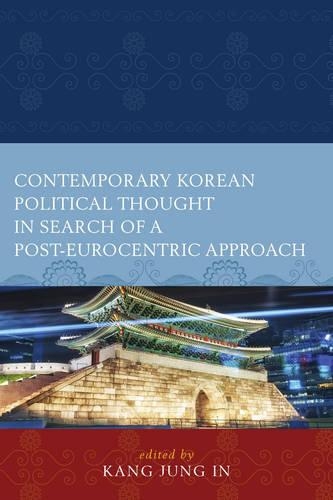
Contemporary Korean Political Thought in Search of a Post-Eurocentric Approach
(Hardback)
Publishing Details
Contemporary Korean Political Thought in Search of a Post-Eurocentric Approach
By (Author) Jung In Kang
Contributions by Jang Dong Jin
Contributions by Jung In Kang
Contributions by Kim Bi-Hwan
Contributions by Kim Dong-Choon
Contributions by Kim Hee-Kang
Contributions by Kim Nam-Kook
Contributions by Kim Seog Gun
Contributions by Kim Sungmoon
Contributions by Kim Yong-Min
Bloomsbury Publishing PLC
Lexington Books
20th November 2014
United States
Classifications
Tertiary Education
Non Fiction
Political science and theory
327.519
Physical Properties
Hardback
368
Width 162mm, Height 234mm, Spine 33mm
685g
Description
This book is a collection of essays written by Korean political theorists addressing the study of contemporary Korean political thought on the premise that such study should be carried out with a post-Eurocentric approach. The negative effects brought about by the domination of Western-centrism are pervasive in academic disciplines as well as in everyday life of South Korea. This book outlines three strategic approaches to combating Western-centrism: (1) theorizing contemporary Korean politics from a Korean perspective, (2) the Koreanization of Western political thought, and (3) modernizing traditional East Asian political thought. These essays examine and explore the validity of the three strategic approaches with the objective of coping with Western-centrism in Korean political theory. These contributing authors share a concern about Western-centrism, but approach it from different directions and at different layers.
Reviews
Contemporary Korean Political Thought is an important collection of high-quality essays exploring the interaction between the Korean and Western traditions of political thought from different perspectives. It shows how to conduct such a dialogue and how, as a result, to develop a conceptual framework capable of theorizing the Korean political life. The work is a most welcome collection in its own right and also as an example to other non-western academic communities. -- Bhikhu Parekh, University of Westminster
Like many other societies in the world the Republic of Korea draws on very different traditions of thinking and political experience in its attempts to interpret its continuing political problems and the resources which it can deploy to meet them. Kang Jung In's absorbing volume draws together the attempts of leading Koreanacademic political theorists principally preoccupied with Korea's reception and transformation of European categories and ideologies and with the responses of interpreters of its ancient Confucian political traditions to the practical and intellectual challenges posed by western and subsequently Japanese imperialism. He counterposes these to its rather less successful attempt to forge new categories of its own to capture and shape the last seven decades of its political experience. The result is a far more synoptic view than any previously available of a society of great vigour and impressive ambition struggling to define its own political identity and judge together how to face its political future. Anyone interested in Korea's tumultuous politics will find much to reflect on in its pages. -- John Dunn, Fellow of King's College & Emeritus Professor of Political Theory, University of Cambridge
With its national division between North and South, recent history of authoritarian government under US tutelage, long-standing tradition of Confucianism and reception of western thought over centuries, Korea provides material aplenty for political theory. Kang Jung In has gathered an insightful group of scholars addressing contemporary issues, the Koreanization of western thought and modernization of Confucian thought. If proof were needed that comparative political theory has come of age, this is it. -- Albert Weale, University College London
In this admirable, excellent, and highly innovative book, leading Korean political theorist, Kang Jung In, and his colleagues confront the pervading problem of Eurocentrism in the Korean Academy. By re-thinking theory in a Korean context and simultaneously projecting Korean thought in a new non-Eurocentric direction, this book is highly relevant to, and extremely topical for, a non-Western and Western readership alike. -- John M. Hobson, Professor of Politics and International Relations, University of Sheffield
Author Bio
Kang Jung In is professor in the Department of Political Science at Sogang University.
